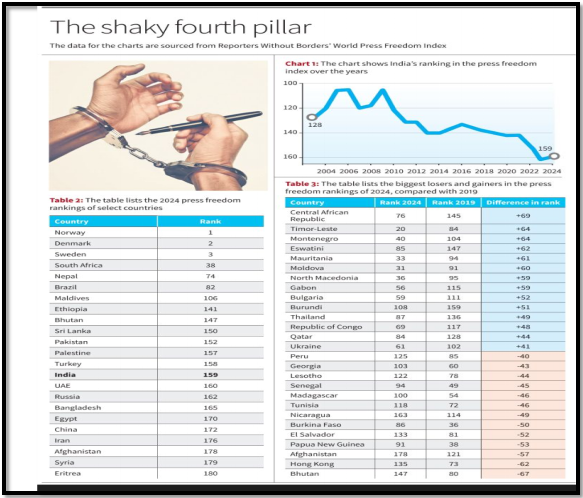INDIA’S PRESS FREEDOM
SYLLABUS:
- GS 2:Important International institutions, agencies and fora- their structure, mandate.
- Important aspects of governance, transparency and accountability, e-governance applications, models, successes, limitations, and potential; citizens charters, transparency & accountability and institutional and other measures.
Focus:
- India is ranked 159 out of the 180 nations considered in the 2024 edition of the press freedom index, published by the organisation Reporters Without Borders.
Press freedom is a fundamental principle that allows journalists and media organizations to operate without censorship or government interference. It is a core component of freedom of expression and is essential for a democratic society.
Key Aspects of Press Freedom
- Freedom from Censorship:Journalists should publish news without government restrictions.
- Access to Information: Media should have unrestricted access to information to report on public interest matters.
- Editorial Independence:News reporting should not be influenced by outside interests, ensuring objectivity.
- Protection of Sources:Allows journalists to keep the identities of their informants confidential.
- Pluralism and Diversity:Encourages a variety of perspectives in the media, enriching public discourse.
Constitutional and International Context
- Constitutional Basis: In India, press freedom is implied under Article 19(1)(a) of the Constitution, which ensures freedom of speech and expression.
- Universal Rights:Article 19 of the Universal Declaration of Human Rights states that everyone has the right to freedom of opinion and expression, including the freedom to seek, receive, and impart information through any media.
- Accountability and Checks:The media plays a critical role in holding those in power accountable by reporting on their actions.
- Legal Restrictions: Article 19(2) of the Indian Constitution places certain restrictions on freedom of speech to protect the nation’s integrity and security.
- International Standards:Press freedom is recognized globally as a right that supports transparency and accountability in governance.
World Press Freedom Index (WPFI)
|
Overview of Press Freedom in India
- Current Ranking: India is ranked 159th out of 180 countries in the 2024 Press Freedom Index.
- Historical Context:India has consistently been ranked below 100 since 2003, indicating long-term issues with press freedom.
- Recent Trends:There has been a rapid erosion in press freedom in recent years, with the country’s ranking dropping to its lowest at 161st in the previous year before slightly improving.
- Comparative Analysis:India’s press freedom is comparable to regions and countries with significant restrictions, such as the occupied Palestinian territories, the UAE, Turkey, and Russia.
- Global Comparison: In contrast to India, Scandinavian countries like Norway, Denmark, and Sweden top the rankings, showcasing high levels of press freedom.
Comparative Rankings
- BRICS Nations:Among the BRICS, Brazil and South Africa have higher press freedom rankings than India, while China and Russia are ranked lower.
- South Asian Context: Most South Asian countries, except Bangladesh, have better press freedom rankings than India.
- Global Decliners and Gainers: Bhutan showed the most significant drop in ranking from 2019 to 2024, while the Central African Republic, Timor-Leste, and Montenegro saw the largest increases.
- Specific Countries’ Challenges: Italy and Argentina have seen notable declines in press freedom over the past five years, influenced by political actions against press agencies.
International Developments and Comparisons
- Hong Kong’s Shift:The Wall Street Journal is relocating its Asia headquarters from Hong Kong to Singapore, influenced by the new national security laws that deter foreign businesses.
- Al Jazeera in Israel:Al Jazeera stopped broadcasting in Israel after the government shut it down, with the channel criticizing the action as criminal.
- Italy and Argentina’s Media Concerns:In Italy and Argentina, governmental efforts to acquire or shut down press agencies have marked significant worries about press freedom.
- Greece’s Press Challenges:Despite improvements, Greece faces criticism for not addressing issues related to journalist wiretapping and the murder of a journalist in 2021.
- Middle Eastern Dynamics:Israel’s press freedom has declined, with its ranking falling from 88th in 2019 to 101st in 2024, amidst governmental crackdowns on media channels like Al Jazeera.
Source:The Hindu
Mains Practice Question:
Analyze the significance of the World Press Freedom Index (WPFI) in assessing the state of press freedom globally. Discuss the limitations of the index in evaluating the overall health of media in different countries. Also, illustrate how such indices can impact government policies and public perception in countries like India, which has shown a declining trend in recent years. (250 words)
Associated Articles:
https://universalinstitutions.com/indias-press-freedom-score-declined-in-the-last-year-rsf/




